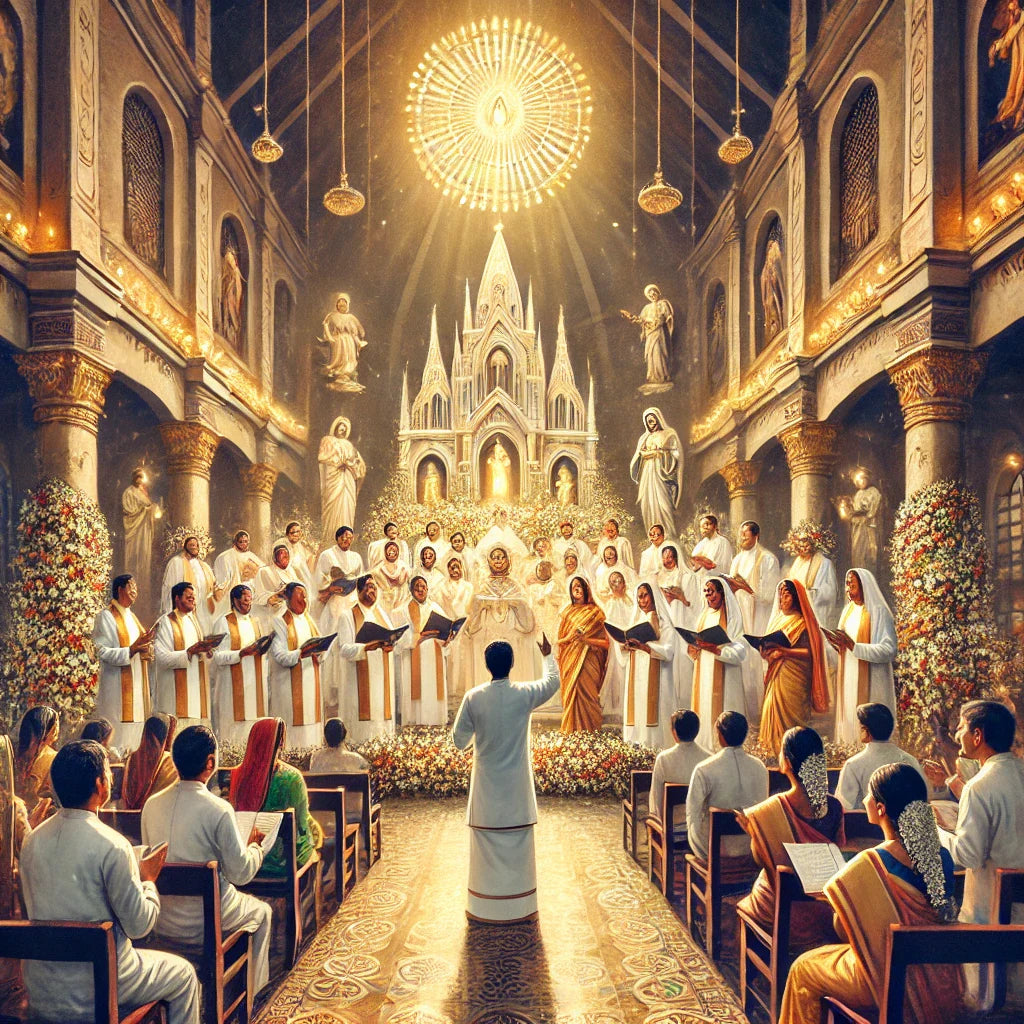
Popular Indian Catholic Hymns
|
|
Time to read 4 min
|
|
Time to read 4 min
Music holds a unique place in the worship and spirituality of the Catholic Church, and in India, hymns play a pivotal role in uniting faith with culture. Across India’s diverse linguistic and regional landscape, hymns in Tamil, Malayalam, Hindi, Konkani, and other languages are cherished for their theological richness and emotional depth. This blog explores some beloved Indian Catholic hymns, delving into their origins, composers, and significance in Catholic devotion.
Indian Catholic hymns are more than just songs; they are an integral part of liturgical celebrations, personal prayer, and community gatherings. Hymns in regional languages make the message of faith accessible, fostering a deep spiritual connection among the faithful. These hymns often blend traditional Indian music styles with Christian theology, creating a unique and uplifting worship experience.
Tamil Nadu, with its rich Christian heritage, has produced many devotional hymns that are widely sung in churches and homes.
"Parishudha Ammae" This hymn, dedicated to the Blessed Virgin Mary, is a heartfelt prayer seeking her intercession. Its soulful melody and powerful lyrics make it a favorite during Marian feasts and processions.
"Athisaya Raatchaneyar" Written by Tamil Christian poets, this hymn celebrates the miraculous works of Christ. It is often sung during Mass and prayer meetings, uplifting the congregation with its joyful tone.
In Kerala, the heartland of India’s Syro-Malabar and Syro-Malankara Catholic communities, hymns in Malayalam reflect a deep liturgical tradition.
"Mariyamme Varu" This hymn, invoking the presence of Mary, is a staple in novenas and Marian processions. Its poetic lyrics express trust in Mary’s maternal care.
"Daivame Kaithozham" This is a popular Malayalam hymn sung during Holy Communion. The hymn’s prayerful tone fosters a deep sense of reverence and devotion among the faithful.
Hindi, as a lingua franca across much of India, has given rise to hymns that unite diverse communities in worship.
"Teri Aradhana Karen" This hymn, meaning “We Worship You,” is a beautiful expression of praise to God. Sung during Eucharistic Adoration and prayer services, it is beloved for its simplicity and heartfelt lyrics.
"Yeshu Tera Naam Sabse Uncha Hai" Celebrating the exalted name of Jesus, this hymn is often sung during retreats and charismatic prayer meetings. Its uplifting melody inspires the congregation to worship with joy.
In Goa and Mangalore, Konkani hymns form an essential part of the Catholic cultural identity.
"Sogllim Ek Kallzanchem" Translated as “All with One Heart,” this hymn is a call for unity and devotion. It is a favorite during Mass and community gatherings.
"Mogan Asonom" A hymn of thanksgiving, it expresses gratitude to God for His blessings. It is commonly sung during weddings and other celebratory occasions.
Many Indian Catholic hymns have roots in the missionary efforts of early Christians in India. Composers often blended Indian musical styles with Western liturgical traditions, creating hymns that resonate with Indian sensibilities.
Tamil Hymns: Missionaries like St. Francis Xavier and later Tamil Christian poets contributed significantly to Tamil hymnody. These hymns often incorporate Carnatic music elements, making them deeply rooted in local culture.
Malayalam Hymns: Hymns in Kerala draw inspiration from the Syriac liturgical tradition and local folk melodies. Composers like Rev. C.M. Joseph and traditional hymnographers have enriched this repertoire.
Hindi Hymns: Many Hindi hymns were composed by Jesuit missionaries who sought to evangelize through culturally relevant music. These hymns are often written in simple, poetic language to appeal to a broad audience.
Konkani Hymns: Goa’s rich musical heritage is reflected in its hymns, many of which were composed by local priests and laypeople who adapted Western hymn styles to Konkani traditions.
Indian Catholic hymns are not just melodious; they are also theologically profound. These hymns often:
Celebrate God’s Attributes: Hymns like "Yeshu Tera Naam Sabse Uncha Hai" exalt God’s majesty and power.
Express Marian Devotion: Hymns such as "Parishudha Ammae" and "Mariyamme Varu" reflect deep love and trust in the Blessed Virgin Mary.
Encourage Faith and Trust: Many hymns focus on themes of hope, healing, and reliance on God’s providence.
Unite Communities: Hymns like "Sogllim Ek Kallzanchem" promote unity and fellowship among the faithful.
Anjali, a young Catholic from Mumbai, shares how Hindi hymns sustained her during a difficult period. “Singing ‘Teri Aradhana Karen’ brought me peace and reminded me of God’s constant presence,” she says.
Thomas from Kerala recalls how Malayalam hymns like "Daivame Kaithozham" deepened his devotion during Holy Communion. “The lyrics and melody drew me closer to God,” he shares.
Choose Hymns Relevant to the Occasion: Select hymns that align with the liturgical season or the theme of the celebration.
Encourage Participation: Provide hymnbooks or project lyrics to help everyone join in singing.
Blend Traditional and Contemporary Styles: Incorporate both classic hymns and modern compositions to cater to diverse tastes.
Promote Regional Hymns: Celebrate the richness of Indian Catholic hymnody by including songs in local languages.
Foster Choirs and Music Groups: Encourage talented parishioners to form choirs, enhancing the musical experience during worship.
Indian Catholic hymns are a beautiful testament to the Church’s ability to embrace and celebrate cultural diversity while staying true to its theological roots. From Tamil hymns steeped in poetic tradition to Malayalam hymns echoing ancient liturgies, these songs enrich the spiritual lives of millions. By singing these hymns, Indian Catholics not only honor their faith but also preserve a vibrant cultural heritage. As these hymns continue to inspire and uplift, they remain a vital part of India’s Catholic identity, uniting communities in a harmonious celebration of God’s love.